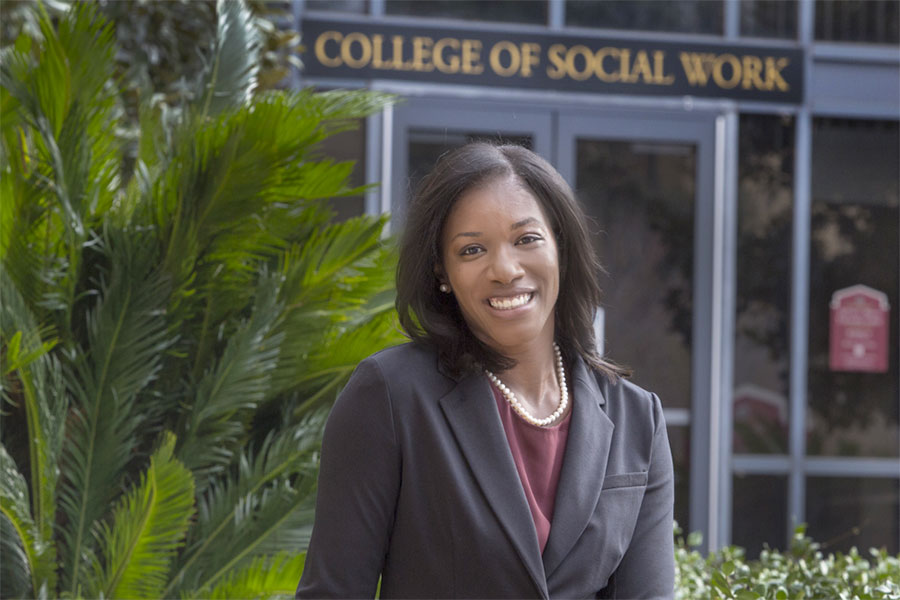
Florida State University has chosen university alumna Jessica Pryce to lead the Florida Institute for Child Welfare.
The institute was created by the Florida Legislature in June 2014 to conduct research, policy analysis and program evaluation of child protection and child welfare services. The measure, Senate Bill 1666, was drafted in response to what lawmakers called a “broken child welfare system.”
The law established a new position of Assistant Secretary for Child Welfare at the Department of Children and Families, a response team to quickly investigate child abuse deaths and the creation of FICW. Lawmakers chose Florida State University to house the institute under the purview of the College of Social Work at FSU.
“The Florida Institute for Child Welfare is a highly significant organization dedicated to serving the entire state through our affiliations with university researchers and other important constituencies in the governmental and private sectors across Florida,” said Jim Clark, dean of the College of Social Work. “We continue to be grateful to the Legislature for placing its trust in FSU and the institute to advance effective policy and practice development. I am very pleased to welcome Dr. Pryce to our faculty to serve as the institute’s new executive director, and I’m confident she will be an exemplary leader.”
Pryce is a national expert on the child welfare workforce and considers her new position the culmination of her interests, skills and experience.
“I’m looking forward to helping Florida get really good at the basics,” Pryce said. “The institute will lead the charge of providing evidence for programs that we have in Florida, because there are a lot of things we’re doing well, but we’re not putting robust testing into our programs. I’m looking forward to helping Florida identify the great services we are providing.”
Prior to Florida State, Pryce served as the deputy director of the New York State Social Work Education Consortium. In this role, she coordinated the Title IV-E funding program, which provided tuition for child welfare employees who were pursuing advanced social work degrees. She also served as the principal investigator for two projects concerning statewide child welfare training evaluation and racial equity in foster care placement.
Pryce is a daughter of Florida, born and raised in the Sunshine State. She received her undergraduate degree from Florida Southern College in Lakeland, and went on to receive her Master of Social Work from FSU in 2009. She worked as a child protective investigator with DCF before moving to Washington, D.C. to pursue her doctoral degree from Howard University. Pryce is ready to serve again in her home state.
Pryce said in her role it will be important to use the funding from legislators to provide evidence behind the services the state is providing for families in Florida. She also wants to make certain that the reports and the research coming from the institute can be translated into public policy in a way that can impact children and families at a practical level.
“The majority of the families seen by DCF are wading in material poverty, living with mental illness and struggling through addictions, all of which result in families becoming even more complex and fragile,” Pryce said. “There is imminent need for a child welfare system that is trustworthy, responsive, effective and results oriented. In order to truly impact families, there must be multiple layers of coordination. My vision for FICW is for it to be a pivotal layer in this process — a layer that is comprehensive, innovative and palpable. “
Already Pryce has a list of things she hopes to accomplish under her leadership. She wants to get to know her team — the staff and students working at the institute. She plans to travel the state to introduce herself and re-introduce the institute to university partners and agencies funded by institute dollars. Pryce also plans to review the research already funded and create a newsletter that will highlight research results.
“We want the work of the institute to be readily available and accessible to legislators, stakeholders and affiliates, but most importantly, frontline counselors, therapists, social workers and case managers,” Pryce said.
Pryce feels the heaviness of the state’s child welfare crisis, like many other child welfare professionals and advocates do. But it only propels her to commit to the work and do it well.
“I foresee it being a challenging and rewarding position, and I think the institute has a good team who are mobilized and empowered to do the work well.”
For details about the Florida Institute for Child Welfare visit ficw.fsu.edu.



